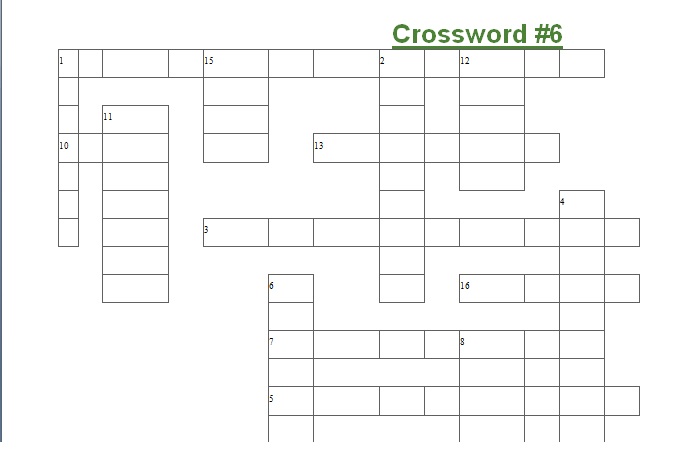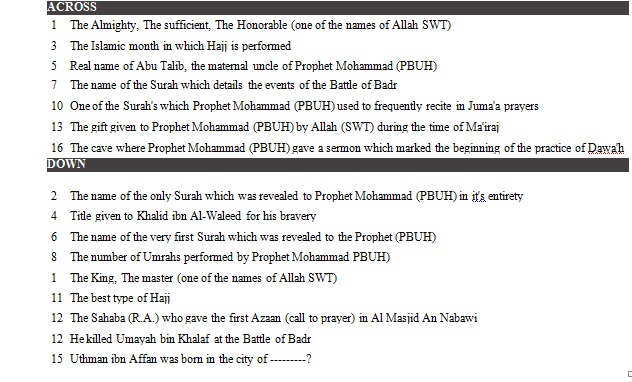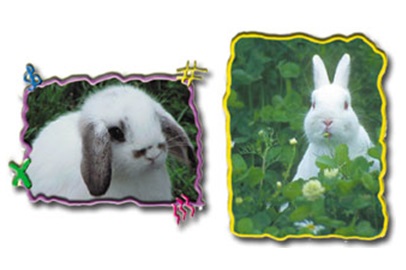Children’s Column
Pen Pal Column
Knowledge≠Money
Amatul Hakim
While knowledge is a gift from God, to be utilized to benefit His creation, we in the present century have been acquiring it as an investment, to get back the returns in the form of money or wealth. Every-one of us wants to live ‘the billion- dollar dream’. Though not many of us achieve that goal, but once achieved, what next? Has the purpose been fulfilled? Has the knowledge been justly utilized? Have we really understood its worth? Nay! Not until it has brought us close to our creator, who guided us towards acquiring it.
Imam Ghazali in his book ‘Ihya Ulum al-Deen,’ has aptly explained that knowledge and good health are the two most valuable things, and to acquire which we need wealth, i.e., to gain knowledge we need to maintain good health, and for good health we need to eat good food, to buy food we need money. Unfortunately, in the race to earn money, we have forgotten the purpose for earning it.
From the religious perspective, Islam is the only religion which greatly emphasises on acquiring knowledge.Islam encourages its followers to learn that which benefits the creation of Allah (swt), and keep away from learning that which is harmful to His creation. Though a Muslim is free to pick the subject of his choice to study on it,there are certain aspects of the religion which is compulsory on every Muslim to learn, it comprises of, belief in one-ness of Allah (swt), actions of worship like five daily prayers, rules of fasting, Hajj and Zakah, and things that are prohibited in Islam.
Our pious predecessors categorised the worldly knowledge into three types – praiseworthy, blameworthy and permissible. Praiseworthy religious knowledge comprises of, study of the Qur’an, sunnah or traditions of our prophet, jurisprudence – theory of Islamic law, Ijma’ or consensus of the scholars on different issues of jurisprudence, and narrations and opinions of the companions of our prophet, because they witnessed the revelation of the Qur’an, and had the opportunity to be with our prophet, and closely observe him.
Knowledge that is necessary for the progress of the world is also categorized as praise-worthy, that includes study of numbers or mathematics, physics, chemistry, botany, zoology, medical sciences, administrative studies to run the government, industrial knowledge for manufacturing goods, study of textiles- a necessity for clothing the human race, agricultural sciences, study of architectural designs and construction etc. Permissible knowledge includes study of the past-history, the study of physical features of the earth and its atmosphere, study of resources of the earth and its location, economical and political conditions of different countries, knowledge of different languages etc. Blameworthy knowledge includes study of stars in order to predict the future- astrology, studies pursuing in films, theatres and acting schools, knowledge of music and musical instruments etc.
A learned and knowledgeable person, an ‘Aalim’ with utmost piety and fear of Allah (swt), who benefits people with his knowledge is not only honoured and respected in the world, but his rank is elevated in the hereafter as well. Allah (swt) honours and gives him special status, his rank is seven hundred times more than the ordinary believer, and the distance between one rank to the other is the distance of a path whose travel time is five hundred years long. A single knowledgeable believer is sufficient to defeat the Shaitan when compared to a hundred ignorant but worshiping believers, who constantly engage themselves with acts of worship.
When we look into the lives of scholars of the past, like Imam Abu-Hanifa, Imam Shafeyi, Imam Ahmed bin Hambal, Imam Malek (may Allah ta’ala have mercy on them all), each one of them were highly qualified judges and teachers. They benefited people with their knowledge and presence of mind, but fled away from the posts that were lucrative. They lived to serve the community, but never wanted to get served.
Once,Imam Abu-Hanifa (may Allah ta’ala have mercy on him) was offered the post of treasurer by the caliph of his time. Perhaps, out of gratitude and appreciation for the blessing of knowledge given to him, which he wanted to utilize only to seek the pleasure of Allah (swt), he rejected the offer. This annoyed the caliph so much that he ordered his deputies to lash the Imam with twenty lashes. Such was the state of our scholarly predecessors. May Allah (swt) guide us all on the same path.
Did You Know That…?
- The Air Force’s F-17 fighter uses aerodynamics discovered during research into how bumblebees fly.
- The sport of jai alai originated from a game played by Incan priests who held cats by their tails and swung at leather balls. The cats would instinctively grab at the ball with their claws, thus enabling players to catch them.
- The typewriter was invented by Hungarian immigrant Qwert Yuiop, who left his “signature” on the keyboard.
- The volume of water that the Giant Sequoia tree consumes in a 24-hour period contains enough suspended minerals to pave 17.3 feet of a 4-lane concrete freeway.
- King Henry VIII slept with a gigantic axe.
- Until 1978, Camel cigarettes contained minute particles of real camels.
Crossword


Ali’s Little Friend
Ali and his family went to the country early one Sunday for a picnic. His mother arranged the picnic materials on the ground.His mother had filled the basket with carrots, Ali’s favorite. Right away, Ali sat under a tree. He was reading a book and eating carrots. He saw a rabbit approaching the basket. Ali sat up slowly, trying not to scare the little rabbit.
“You must be hungry, little rabbit,” he said.
“Well… yes. I like carrots a lot,” the rabbit agreed.
“Come on,” said Ali: “Let’s eat them together and talk. There are many things I’d like to ask you….”
 The rabbit began speaking: “We rabbits live in nests called burrows, which we dig under the ground. And carrots suit our underground life very well because they grow down into the ground. So, we can find them easily. Carrots are our favourite food, and Allah has created them so that we have no difficulty in finding them. Because Allah wills it to be this way, we have no problem finding food. This is one of the miracles of His creation.”
The rabbit began speaking: “We rabbits live in nests called burrows, which we dig under the ground. And carrots suit our underground life very well because they grow down into the ground. So, we can find them easily. Carrots are our favourite food, and Allah has created them so that we have no difficulty in finding them. Because Allah wills it to be this way, we have no problem finding food. This is one of the miracles of His creation.”
Ali thought how Allah has created everything just in right way for animals to use. He remembered noticed that Allah had given rabbits their large front teeth to gnaw carrots with.
“OK,” said Ali, “What other special abilities has Almighty Allah given to you?”
The rabbit replied: “Allah has given every creature abilities to make its life easier. There are many kinds of rabbits with different abilities in the world. For example, rabbits that live in cold regions are usually white, so that they are hard to see in the snow and can hide easily. Wild rabbits like me have longer legs and ears. Rabbits that live in the American desert have huge ears. They help the rabbits to cool off in the heat of the desert.”
Ali nodded: “Everyone knows the story of you and the tortoise. You’re a fast runner, aren’t you?”
“Yes,” nodded the rabbit. “My back legs are longer and more powerful than my front ones. So I can run between 40 and 45 miles an hour (60 km/h and 70 km/h) and sometimes leap 20 feet (6 meters) in a single jump.”
“So, how do you find your underground home, and when you’re not there, does another rabbit move in?” Ali wondered.
“Some animals mark their houses with a scent,” his new friend explained. “For example, gazelles leave behind a substance secreted from a gland under their eyes. The scent from this substance marks the territory in which they live. We have glands in our jaws and we mark our homes with the scent from them. So another rabbit doesn’t move in and we can find our houses easily. Of course, this is not something we do by ourselves, but by Allah’s inspiration.”
“Do you have any brothers and sisters?” asked Ali.
 “We rabbits have lots of babies,” answered his friend. “Our mothers are only pregnant for a short time, about 28-33 days. They give birth to many babies at one time. For example, I have 15 brothers and sisters… The young stay with their mother for about one month. And rabbits have another characteristic: they can mate 3-4 days after they are born.”
“We rabbits have lots of babies,” answered his friend. “Our mothers are only pregnant for a short time, about 28-33 days. They give birth to many babies at one time. For example, I have 15 brothers and sisters… The young stay with their mother for about one month. And rabbits have another characteristic: they can mate 3-4 days after they are born.”
At that moment, Ali’s father came and joined in their conversation.”Even I didn’t know all this, little rabbit,” he said: “May Allah reward you well. How wonderfully He has created the whole universe and everything and every creature in it. In the Qur’an our Almighty Lord says:
That is Allah, your Lord. There is no god but Him, the Creator of everything. So worship Him. He is responsible for everything. (Surat al-An’am: 102)
 “Dad,” asked Ali: “If you just look around and consider, there’s so much to be thankful for, isn’t there? A tree we see every day, a bird flying, a little rabbit… When you look carefully at all these things, you see a perfect Creation in each one of them. And it is only the perfect creative power of Almighty Allah that can do this, isn’t that right? Otherwise, how could a rabbit be smart enough to acquire all these abilities by itself?”
“Dad,” asked Ali: “If you just look around and consider, there’s so much to be thankful for, isn’t there? A tree we see every day, a bird flying, a little rabbit… When you look carefully at all these things, you see a perfect Creation in each one of them. And it is only the perfect creative power of Almighty Allah that can do this, isn’t that right? Otherwise, how could a rabbit be smart enough to acquire all these abilities by itself?”
“You’re right, Ali,” replied the rabbit: “If Allah didn’t give us all our abilities when He created us, none of us have the power to acquire them on our own.”
Ali’s father added: “Ali, it was good that we came on this picnic. At first you didn’t want to come with us, but then you got to know this little rabbit and your conversation has made you think about a few things.”
“You’re right, Dad,” Ali agreed. “Our conversation has helped me to see Allah in everything. Thank you, little rabbit. I have to go with my father now. I’ll ask my mother if we have any more carrots, and if we do, I’ll bring them to you. See you later; masalama for now.”
“Thank you, Ali,” said the little rabbit. “May Allah bless you.”
Interesting Facts About Rabbits
- Rabbits can jump to a height of more than 36 inches.
- A rabbit can see behind himself, without turning his head, but has a blind spot in front of his face.
- Rabbits can purr, just like a cat.
- Domestic rabbits cannot breed with wild rabbits.
- Rabbits eat their own night droppings, known as cecotropes.
- Rabbits cannot vomit.
- The teeth of a rabbit never stop growing.
- The largest litter of baby rabbits was 24 and it has been witnessed twice.
- When rabbits are happy, they jump and twist.
- There are over 150 different colors of a rabbit’s coat, but only 5 eye colors (brown, blue-grey, blue, marbled, and pink)
- Rabbits weigh between 2 to 11 pounds. However, this is an average estimate. The world record for the heaviest rabbit is set at 50 pounds, while the smallest recorded rabbit weighed only 60 grams!
On the lighter side…
Clever kids:
A police officer found a perfect hiding place for watching for speeding motorists.
One day, the officer was amazed when everyone was under the speed limit, so he investigated and found the problem.
A 10 years old boy was standing on the side of the road with a huge hand painted sign which said “Radar Trap Ahead.”
A little more investigative work led the officer to the boy’s accomplice: another boy about 100 yards beyond the radar trap with a sign reading “TIPS” and a bucket at his feet full of change.
The child and his mother:
A curious child asked his mother: “Mommy, why are some of your hairs turning grey?”
The mother tried to use this occasion to teach her child: “It is because of you, dear. Every bad action of yours will turn one of my hairs grey!”
The child replied innocently: “Now I know why grandmother has only grey hairs on her head.”
The Sabzi Wala and The Rock
In ancient times, a king had a boulder placed on a roadway. Then he hid himself and watched to see if anyone would remove the huge rock. Some of the king’s wealthiest merchants and courtiers came by and simply walked around it.
Many loudly blamed the king for not keeping the roads clear, but none did anything about getting the big stone out of the way. Then a peasant came along carrying a load of vegetables. On approaching the boulder, the peasant laid down his burden and tried to move the stone to the side of the road. After much pushing and straining, he finally succeeded. As the peasant picked up his load of vegetables, he noticed a purse lying in the road where the boulder had been. The purse contained many gold coins and a note from the king indicating that the gold was for the person who removed the boulder from the roadway. The peasant learned what many others never understand.
Every obstacle presents an opportunity to improve one’s condition.

